My Sister's Keeper
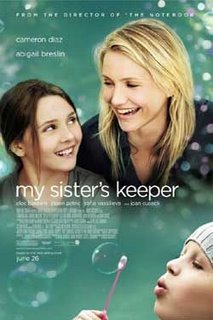 There's nothing wrong with the premise of My Sister's Keeper, it just needed to be handled a different way. Here is a movie that cries out for a serious and even-handed look at the ethical issues it raises. Does a girl who is in the final stages of cancer have a right to choose to die? Does her younger sister, who was genetically created to act as a donor for the sick girl from birth, have a right to refuse to give up her organs if she wants to lead a normal life herself? If the movie had been honest and hard-hitting, it could have been a stunner.
There's nothing wrong with the premise of My Sister's Keeper, it just needed to be handled a different way. Here is a movie that cries out for a serious and even-handed look at the ethical issues it raises. Does a girl who is in the final stages of cancer have a right to choose to die? Does her younger sister, who was genetically created to act as a donor for the sick girl from birth, have a right to refuse to give up her organs if she wants to lead a normal life herself? If the movie had been honest and hard-hitting, it could have been a stunner.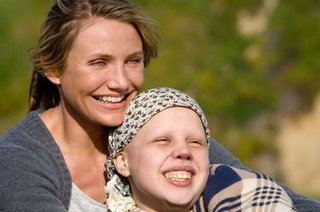 Director and co-writer, Nick Cassavetes (The Notebook), instead takes the path of heavy-handed sentiment and sappy manipulation. Instead of actually dealing with the issues, he gives us numerous music montages, and scenes that have been manipulated to get the full melodramatic effect. Take, for example, a scene late in the film where the parents of the two girls confront each other about what's best for their dying daughter. The father, Brian Fitzgerald (Jason Patric) has gotten permission from the doctor at the hospital to allow young Kate (Sofia Vassilieva) to leave the hospital and go to the beach for one day as a final memory, since she's not getting any better, and could slip away any day. The doctor arranges for her leave. Brian takes the girl home first, where the mother, Sara (Cameron Diaz), learns what her husband is planning to do. She screams at him for letting their daughter leave the hospital, he screams back, and they threaten to divorce each other. Not once does Brian mention what the doctor told him, or that everything has been arranged. If he did, there would be no reason for the couple to spend the entire scene screaming at each other.
Director and co-writer, Nick Cassavetes (The Notebook), instead takes the path of heavy-handed sentiment and sappy manipulation. Instead of actually dealing with the issues, he gives us numerous music montages, and scenes that have been manipulated to get the full melodramatic effect. Take, for example, a scene late in the film where the parents of the two girls confront each other about what's best for their dying daughter. The father, Brian Fitzgerald (Jason Patric) has gotten permission from the doctor at the hospital to allow young Kate (Sofia Vassilieva) to leave the hospital and go to the beach for one day as a final memory, since she's not getting any better, and could slip away any day. The doctor arranges for her leave. Brian takes the girl home first, where the mother, Sara (Cameron Diaz), learns what her husband is planning to do. She screams at him for letting their daughter leave the hospital, he screams back, and they threaten to divorce each other. Not once does Brian mention what the doctor told him, or that everything has been arranged. If he did, there would be no reason for the couple to spend the entire scene screaming at each other.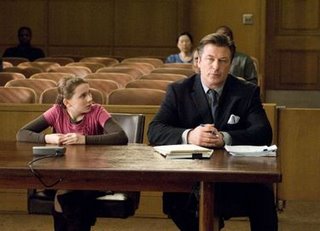 We learn through various clumsily-placed flashbacks (which at times take up a majority of the film) that Kate was once a normal and healthy girl, until she was diagnosed with leukemia at a young age. Brian and Sara could not find a donor, and so the doctor told them how they could genetically give birth to another child who would be a perfect genetic match, and could possibly save young Kate's life. This would obviously be a tough decision, giving birth to a child who would exist solely to be cut up and operated on as Kate needed it in her different stages of the disease. Brian and Sara, however, need only three seconds to decide to go with the plan. The child in question is Anna (Abigail Breslin). She loves her sister Kate, and understands her purpose and how important she is, but now that she is 11, she is starting to think for herself and question why she has to give up her own life so that Kate (who is worsening, and not responding well to treatments) can live. Her mom won't hear any of it, as she's too wrapped up in keeping Kate alive, and her father's hardly ever home. Her older brother, Jesse (Evan Ellingson), is no help either. He's too busy standing on street corners looking tortured, and performing sad music montages for reasons we don't understand until late in the film. That's when Anna makes an important decision.
We learn through various clumsily-placed flashbacks (which at times take up a majority of the film) that Kate was once a normal and healthy girl, until she was diagnosed with leukemia at a young age. Brian and Sara could not find a donor, and so the doctor told them how they could genetically give birth to another child who would be a perfect genetic match, and could possibly save young Kate's life. This would obviously be a tough decision, giving birth to a child who would exist solely to be cut up and operated on as Kate needed it in her different stages of the disease. Brian and Sara, however, need only three seconds to decide to go with the plan. The child in question is Anna (Abigail Breslin). She loves her sister Kate, and understands her purpose and how important she is, but now that she is 11, she is starting to think for herself and question why she has to give up her own life so that Kate (who is worsening, and not responding well to treatments) can live. Her mom won't hear any of it, as she's too wrapped up in keeping Kate alive, and her father's hardly ever home. Her older brother, Jesse (Evan Ellingson), is no help either. He's too busy standing on street corners looking tortured, and performing sad music montages for reasons we don't understand until late in the film. That's when Anna makes an important decision.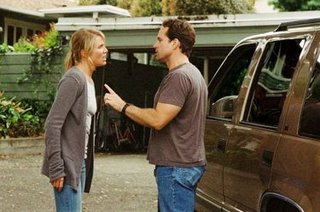 She turns to a lawyer she sees on TV named Campbell Alexander (Alec Baldwin), and with $700 she got from pawning off a gold chain, hires him to take on her case - She wishes to "medically emancipate" herself from her parents, so that she doesn't have to give up her organs to her sister unless it is her own decision. The drama is supposed to build around Anna's decision, and the effect the impending trial has on the family itself, but the movie keeps on getting sidetracked with one flashback after another. We get flashbacks on how Sara gave up everything, even her job, so she could look after Kate. We get flashbacks on how Kate had a brief romantic fling with another cancer patient at the hospital named Taylor (Thomas Dekker). We get flashbacks on how brother Jesse used to suffer from dyslexia as a child. A lot of this information seems crammed into the movie, almost as if screenwriters Cassavetes and Jeremy Leven were afraid to take stuff out of the original novel by Jodi Picoult. (Surprisingly, I hear the movie changes a lot of details from the book, especially the ending.) We also get personal information on minor characters that has nothing to do with anything, and doesn't add anything to the film. The Judge who presides over the trial (Joan Cusack) lost her daughter in a drunk driving accident. Anna's lawyer in the trial needs a service dog by his side at all times, as he suffers from epileptic seizures that conveniently hit him at the right dramatic moment in the trial itself. The movie tells us this, then does nothing with it.
She turns to a lawyer she sees on TV named Campbell Alexander (Alec Baldwin), and with $700 she got from pawning off a gold chain, hires him to take on her case - She wishes to "medically emancipate" herself from her parents, so that she doesn't have to give up her organs to her sister unless it is her own decision. The drama is supposed to build around Anna's decision, and the effect the impending trial has on the family itself, but the movie keeps on getting sidetracked with one flashback after another. We get flashbacks on how Sara gave up everything, even her job, so she could look after Kate. We get flashbacks on how Kate had a brief romantic fling with another cancer patient at the hospital named Taylor (Thomas Dekker). We get flashbacks on how brother Jesse used to suffer from dyslexia as a child. A lot of this information seems crammed into the movie, almost as if screenwriters Cassavetes and Jeremy Leven were afraid to take stuff out of the original novel by Jodi Picoult. (Surprisingly, I hear the movie changes a lot of details from the book, especially the ending.) We also get personal information on minor characters that has nothing to do with anything, and doesn't add anything to the film. The Judge who presides over the trial (Joan Cusack) lost her daughter in a drunk driving accident. Anna's lawyer in the trial needs a service dog by his side at all times, as he suffers from epileptic seizures that conveniently hit him at the right dramatic moment in the trial itself. The movie tells us this, then does nothing with it.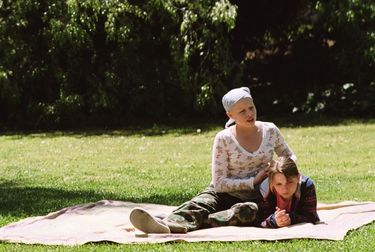 My Sister's Keeper works the tear ducts hard, and I did indeed hear much sniffling in the rows behind me at my screening. I personally started to wish that the movie was more interested in exploring its own ideas, rather than going for the cheap sentimentality in every scene. It ultimately ends up being as flimsy as the discarded Kleenex on the theater floor. And yet, there's a lot to admire here. The movie is well shot, and the performances are mostly strong. Young Abigail Breslin and Sofia Vassilieva have a good sisterly chemistry during their few scenes alone. We buy their relationship, and we buy that they care for each other, and why Anna has come to the decision she has at the beginning of the film when she walks into the law office. Jason Patric also stands out as the father, giving a quiet and understated performance. It's something Cameron Diaz could have learned, who spends a majority of her scenes shrieking or screaming, and generally rubbed me the wrong way every time she was on the screen. She plays up the melodrama every chance she gets, and leaves no piece of the set un-chewed when she's done. As the eldest brother of the family, Evan Ellingson is given a mainly thankless role, and never makes much of an impression. Outside of the family, both Alec Baldwin and Joan Cusack bring their experience to their individual roles, but more could have been done with their characters.
My Sister's Keeper works the tear ducts hard, and I did indeed hear much sniffling in the rows behind me at my screening. I personally started to wish that the movie was more interested in exploring its own ideas, rather than going for the cheap sentimentality in every scene. It ultimately ends up being as flimsy as the discarded Kleenex on the theater floor. And yet, there's a lot to admire here. The movie is well shot, and the performances are mostly strong. Young Abigail Breslin and Sofia Vassilieva have a good sisterly chemistry during their few scenes alone. We buy their relationship, and we buy that they care for each other, and why Anna has come to the decision she has at the beginning of the film when she walks into the law office. Jason Patric also stands out as the father, giving a quiet and understated performance. It's something Cameron Diaz could have learned, who spends a majority of her scenes shrieking or screaming, and generally rubbed me the wrong way every time she was on the screen. She plays up the melodrama every chance she gets, and leaves no piece of the set un-chewed when she's done. As the eldest brother of the family, Evan Ellingson is given a mainly thankless role, and never makes much of an impression. Outside of the family, both Alec Baldwin and Joan Cusack bring their experience to their individual roles, but more could have been done with their characters.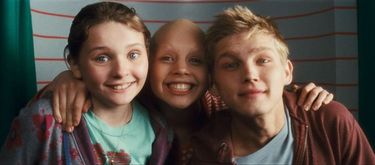
See the movie times in your area or buy the DVD at Amazon.com!






0 Comments:
Post a Comment
<< Home